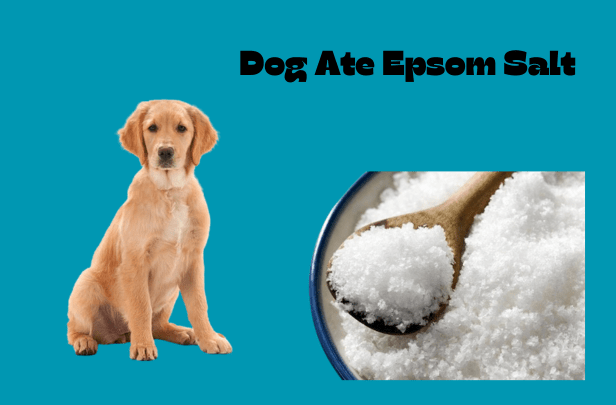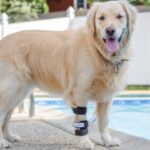When a dog eats Epsom salt, it’s a situation that calls for immediate attention. Epsom salt, or magnesium sulfate, is a chemical compound that’s often used in baths for humans to relieve sore muscles and stress.
However, ingesting Epsom salt can lead to a range of health issues for dogs. While not toxic in the traditional sense, Epsom salt can cause significant gastrointestinal upset in canines.
Symptoms may include vomiting, diarrhea, lethargy, and in severe cases, more critical conditions such as metabolic alkalosis or salt poisoning. Pet owners must understand the risks associated with Epsom salt and keep it out of reach of their pets.
If an incident occurs, knowing the signs and seeking veterinary care promptly can be crucial for the health and well-being of their furry friend.
Contents
- 1 Epsom Salt Ingestion in Dogs: A Cautionary Tale
- 2 The Risks of Epsom Salt to Canines
- 3 Understanding Salt Toxicosis
- 4 Is Epsom Salt Bad for Dogs if Ingested?
- 5 Is Epsom Salt a Salt?
- 6 Can You Soak a Dog’s Wound in Epsom Salt?
- 7 How Much Should I Use for My Dog in Epsom Salts?
- 8 Is Epsom Salt Safe for Dogs’ Paws? Epsom salt
- 9 Is Eucalyptus Epsom Salt Safe for Dogs?
- 10 What is the Difference Between Salt and Epsom?
- 11 What are the Side Effects of Epsom Salt?
- 12 Is Epsom Salt Safe for Dogs and Cats?
- 13 What is the Veterinary Use of Epsom Salt?
- 14 Conclusion
- 15 FAQs About dog ate Epsom salt
Epsom Salt Ingestion in Dogs: A Cautionary Tale
When it comes to our furry friends, we often go to great lengths to ensure their safety and well-being. However, sometimes the unexpected happens, and they might ingest something they shouldn’t.
One such substance is Epsom salt (magnesium sulfate), commonly used in baths for relaxation or to soothe aches. But what happens when a dog consumes Epsom salt?
Related Dog Health: Can I Cut My Dog’s Whiskers?
The Risks of Epsom Salt to Canines
Ingestion of Epsom salt can pose significant health risks to dogs. While not inherently toxic, the compound can cause mild to severe gastrointestinal upset.
Symptoms may include vomiting, diarrhea, lethargy, and depression. In more severe cases, excessive intake may lead to electrolyte imbalances, organ damage, or even poisoning.
Understanding Salt Toxicosis
Salt toxicosis, or hypernatremia, occurs when there’s an excessive amount of salt in the bloodstream. This condition can cause cells to release water to balance the salt levels, leading to dehydration and neurological symptoms such as dizziness, headaches, and seizures.
If a dog ingests a large quantity of Epsom salt and does not have access to fresh water, the risk of salt toxicosis increases significantly.
First Aid and Treatment
If you suspect your dog has ingested Epsom salt, it’s crucial to provide fresh water immediately to help dilute the salt concentration in the blood.
Contact your veterinarian as soon as possible, as they may recommend inducing vomiting or administering intravenous fluids to manage dehydration and electrolyte imbalance.
Prevention is Key
To prevent such incidents, always store Epsom salt and other potential toxins out of reach of pets. Be mindful of the substances you use around them, and never assume that what’s safe for humans is safe for dogs.
Is Epsom Salt Bad for Dogs if Ingested?
Ingesting Epsom salt, which is not the same as table salt, can be harmful to dogs. It can lead to metabolic alkalosis and Epsom salt poisoning, which are serious conditions.
Symptoms of ingestion include vomiting, diarrhea, and lethargy. If a dog consumes Epsom salt, immediate veterinary care is necessary.
Is Epsom Salt a Salt?
Epsom salt is not a regular salt, despite its name. It is a mineral compound known as magnesium sulfate. It’s different from table salt, which is sodium chloride, and has various uses, including as a bath soak and a laxative.
Can You Soak a Dog’s Wound in Epsom Salt?
Yes, soaking a dog’s wound in an Epsom salt solution can be beneficial. It can help to soothe and clean wounds, relieve sore muscles, and reduce inflammation. However, it’s important to prevent the dog from ingesting the water to avoid digestive issues.
How Much Should I Use for My Dog in Epsom Salts?
The amount of Epsom salt used for a dog’s soak should be about one cup per gallon of water. For smaller treatments, such as soaking paws, you can use a solution of 4-5 tablespoons of Epsom salt per bowl of water.
Is Epsom Salt Safe for Dogs’ Paws? Epsom salt
soaks can be safe for dogs’ paws and beneficial for healing minor scratches and soothing tender paw pads7. It’s important to ensure that the dog does not drink the soaked water.
Is Eucalyptus Epsom Salt Safe for Dogs?
While Epsom salt itself can be safe for external use on dogs, eucalyptus oil, often added to Epsom salt for aromatic baths, can be harmful to dogs if ingested or inhaled in large quantities. It’s best to consult with a veterinarian before using products containing eucalyptus on your dog.
What is the Difference Between Salt and Epsom?
The primary difference between table salt and Epsom salt lies in their chemical composition. Table salt is primarily sodium chloride (NaCl), while Epsom salt is magnesium sulfate (MgSO4).
While both may appear similar in their crystalline form, their uses and effects on the body are quite distinct. Epsom salt is widely used for its therapeutic benefits, such as relieving muscle soreness and stress.
What are the Side Effects of Epsom Salt?
While Epsom salt can offer health benefits, it’s not without potential side effects. When used excessively or ingested, it may cause bloating, diarrhea, nausea, and more severe symptoms like confusion, dizziness, or irregular heartbeat. It’s crucial to use Epsom salt as directed to avoid these adverse effects.
Is Epsom Salt Safe for Dogs and Cats?
Epsom salt can be safe for dogs and cats when used externally and appropriately, such as in soaks for wounds or to relieve muscle soreness. However, ingestion of Epsom salt by pets can lead to gastrointestinal upset and more serious health issues. Always consult a veterinarian before using Epsom salt for pet care.
What is the Veterinary Use of Epsom Salt?
In veterinary medicine, Epsom salt is used for its anti-inflammatory properties and ability to draw out toxins. It can be beneficial for dogs suffering from allergies, treating open wounds, relieving skin discomfort, and easing muscle aches.
It’s also used as a poultice for acute swellings and other conditions. However, care must be taken to prevent animals from ingesting the solution, as it can disrupt their digestive system.
Conclusion
Dogs eat Epsom salt while Epsom salt has its uses for humans, it can be dangerous for dogs if ingested. Always exercise caution and keep such substances away from your pets to ensure their safety and health. If an accident occurs, prompt action and veterinary care can make all the difference in your dog’s recovery. Remember, prevention is always better than cure.
if your dog has accidentally ingested Epsom salt, it’s important to act quickly. The ingestion of Epsom salt can lead to serious health issues, including gastrointestinal upset, electrolyte imbalances, and even poisoning.
If you suspect that your dog has eaten Epsom salt, it’s essential to contact your veterinarian immediately for guidance. Remember, prevention is key, so always keep potentially harmful substances out of reach of your pets.
FAQs About dog ate Epsom salt
1. What should I do if my dog ate Epsom salt?
- If your dog has ingested Epsom salt, it’s crucial to contact your veterinarian immediately. They will guide the next steps, which may include inducing vomiting or providing supportive care.
2. What are the symptoms of Epsom salt poisoning in dogs?
- Symptoms of Epsom salt poisoning in dogs may include vomiting, diarrhea, lethargy, and depression. In severe cases, it can lead to electrolyte imbalances, organ damage, or seizures.
3. Can Epsom salt be used safely for dogs?
- Epsom salt can be used safely for dogs externally, such as in soaks for wounds or to relieve muscle soreness. However, ingestion of Epsom salt by dogs can be harmful and should be avoided.
4. How can I prevent my dog from ingesting Epsom salt?
- To prevent your dog from ingesting Epsom salt, always store it and other potential toxins out of reach of pets. Be mindful of the substances you use around them, and never assume that what’s safe for humans is safe for dogs.
5. Is Epsom salt toxic to other pets, such as cats?
- While Epsom salt can be safe for external use on cats, ingestion can lead to gastrointestinal upset and more serious health issues. Always consult a veterinarian before using Epsom salt for pet care, especially for cats.




